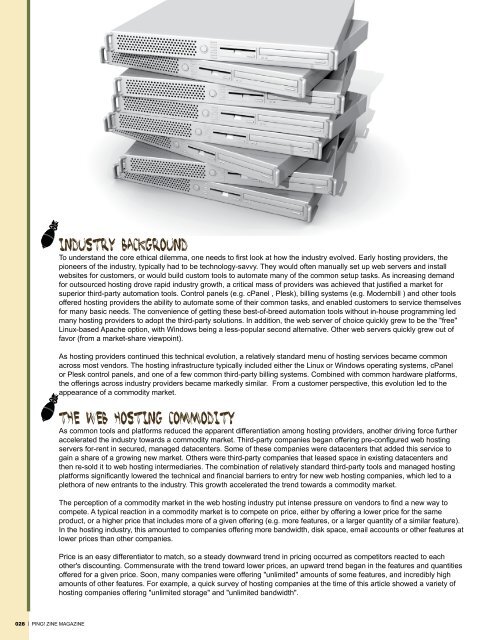3 - Ping! Zine Web Tech Magazine
3 - Ping! Zine Web Tech Magazine
3 - Ping! Zine Web Tech Magazine
You also want an ePaper? Increase the reach of your titles
YUMPU automatically turns print PDFs into web optimized ePapers that Google loves.
Industry Background<br />
To understand the core ethical dilemma, one needs to first look at how the industry evolved. Early hosting providers, the<br />
pioneers of the industry, typically had to be technology-savvy. They would often manually set up web servers and install<br />
websites for customers, or would build custom tools to automate many of the common setup tasks. As increasing demand<br />
for outsourced hosting drove rapid industry growth, a critical mass of providers was achieved that justified a market for<br />
superior third-party automation tools. Control panels (e.g. cPanel , Plesk), billing systems (e.g. Modernbill ) and other tools<br />
offered hosting providers the ability to automate some of their common tasks, and enabled customers to service themselves<br />
for many basic needs. The convenience of getting these best-of-breed automation tools without in-house programming led<br />
many hosting providers to adopt the third-party solutions. In addition, the web server of choice quickly grew to be the "free"<br />
Linux-based Apache option, with Windows being a less-popular second alternative. Other web servers quickly grew out of<br />
favor (from a market-share viewpoint).<br />
As hosting providers continued this technical evolution, a relatively standard menu of hosting services became common<br />
across most vendors. The hosting infrastructure typically included either the Linux or Windows operating systems, cPanel<br />
or Plesk control panels, and one of a few common third-party billing systems. Combined with common hardware platforms,<br />
the offerings across industry providers became markedly similar. From a customer perspective, this evolution led to the<br />
appearance of a commodity market.<br />
C<br />
M<br />
Y<br />
CM<br />
MY<br />
CY<br />
CMY<br />
K<br />
The <strong>Web</strong> Hosting Commodity<br />
As common tools and platforms reduced the apparent differentiation among hosting providers, another driving force further<br />
accelerated the industry towards a commodity market. Third-party companies began offering pre-configured web hosting<br />
servers for-rent in secured, managed datacenters. Some of these companies were datacenters that added this service to<br />
gain a share of a growing new market. Others were third-party companies that leased space in existing datacenters and<br />
then re-sold it to web hosting intermediaries. The combination of relatively standard third-party tools and managed hosting<br />
platforms significantly lowered the technical and financial barriers to entry for new web hosting companies, which led to a<br />
plethora of new entrants to the industry. This growth accelerated the trend towards a commodity market.<br />
The perception of a commodity market in the web hosting industry put intense pressure on vendors to find a new way to<br />
compete. A typical reaction in a commodity market is to compete on price, either by offering a lower price for the same<br />
product, or a higher price that includes more of a given offering (e.g. more features, or a larger quantity of a similar feature).<br />
In the hosting industry, this amounted to companies offering more bandwidth, disk space, email accounts or other features at<br />
lower prices than other companies.<br />
Price is an easy differentiator to match, so a steady downward trend in pricing occurred as competitors reacted to each<br />
other's discounting. Commensurate with the trend toward lower prices, an upward trend began in the features and quantities<br />
offered for a given price. Soon, many companies were offering "unlimited" amounts of some features, and incredibly high<br />
amounts of other features. For example, a quick survey of hosting companies at the time of this article showed a variety of<br />
hosting companies offering "unlimited storage" and "unlimited bandwidth".<br />
028 | <strong>Ping</strong>! <strong>Zine</strong> magazine
















